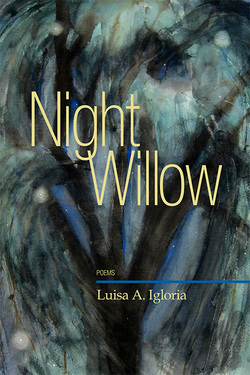
Reviewed November 1, 2014 by Karen An-hwei Lee.
Professor of belles lettres, celebrated author of over a dozen books, the award-winning Filipina American poet Luisa A. Igloria has written at least a poem daily since November 20, 2010. Impressively, while produced at an incredible velocity, Igloria’s voluminous output never sacrifices attention to technique or imaginative scope: enduring motifs of womanhood, spirituality, and cultural heritage persist in fresh explorations of lyric terrain. As evidence, I could pick dozens of memorable lines from Night Willow. Here’s a poem with several favorites:
“Landscape, with Things Falling from the Sky”
It ticks, the iris underneath: the heavy-lidded eye in its leathered
sac blinks open, mercurial, at the slightest touch. So falls the sky in
fable: as a leaf, as a flutter of feathers, as an acorn pinging across a
table of rock. Fear is the room where it all echoes. Or love. A galaxy
is only a dark umbrella someone opens so rain can streak the grass.
When all the water’s gone, the ribs shine dull silver. In the spaces far
between are stars.
The poems of Night Willow display lyric precision with a dexterous use of enjambment, lending a unique torque to lines in “Compass,” where “the sun wrote its / progress in swirls of turmeric and ink. Heat or no heat, everyone / mostly walked to where they were going.” With surprising turns, the lines dare to break at unusual points, even articles like “the:”
…I’ve snipped the
leather buttons off an old cardigan, saving them for some unknown
occasion in which I might revive their charm.
“In passing,” headed by a New Testament epigraph from John 3:8, sparse yet lush in its sensory impressions, limns moisture rising from flagstones to whole shrimp on a sizzling hibachi grill or purely melodic sound as image, “5. The brass bell swings: small rings of sound under the dogwood.” While countless poems testify to Igloria’s fine eye for detail, the sum is far greater than miniscule catalogues of observation. Underpinning Night Willow, an elemental passion infuses the collection with love, hunger, and desire, emblematized in a “small mouthful of sweet azuki bean / entombed like a heart in the center” at the end of “Thaw:”
…Sometimes I think I want that. Sometimes I want to
be both the mountains emerging from their heavy robes of ice and
snow, and the streams they feed below, rushing and teeming with
color and new life. Sometimes I want to be the clear unflavored
envelope of agar, other times the small mouthful of sweet azuki bean
entombed like a heart in the center.
I particularly enjoyed the image-laden motifs of female generational wisdom and women warriors in “Index,” where an extended meditation on soul journeys introduces the word, nakem:
When the hero of a thousand journeys is born, part of her soul
spirals into a plant that her mother has made to take root in the
soil. A sunflower perhaps. Or a sapling that grows rapidly into a
tree, leaning and breaking into blossom against the wind. Between
every journey is a threshold.
. . .
In old stories, the elders speak of warriors with heart:
nakem; of growing wiser as growing in heart. Perhaps, what they
mean is that capacity not only to survive what gusts in to level us
all – Admit we’ve traced the fragile vein in the leaf, in the flower;
seen it pulsing at the base of each other’s throats.
A special note on book design, wherein the majority of Night Willow’s poems appear on right-hand pages: in codicology terms, the poems are recto; verso is blank. A handful of poems do run verso-recto, left to right across pages. The overall effect of this design is handsomely elegant as the blank verso pages breathe like spaces of meditation: Is it presence? Absence? Margin of contemplation? Prayer? A visual metaphor for _______?
“Tremolo,” a lovely poem titled after a musical term, is the expressive trembling of a violin string or human voice on a single note. Indeed, the aural resonance of Igloria’s language trembles with emotion in musical expressions of longing, “the faltering notes of what we want so much to say but can’t.”
“Tremolo”
Dear invisible hand scribing the surface of this vinyl platter, you
usher in a new soundtrack: buzz of a black-throated warbler,
catbird’s brassy solo. All cool and nonchalant – but underneath: the
faltering notes of what we want so much to say but can’t. Fluttering
skin, stroked by feathers. If I begged you to stay, if I begged you to
take me away? What then? But I don’t. In the evenings, the crickets
repeat their two-note arias. Under the trees, fireflies send stuttering
messages across the dark.
This marvelous attention to motion and transformation surfaces in “Lumen” with a slight focus on the visual and tactile:
“Lumen”
Showers of white dust. Blossoms shedding soft as paper from
overhead, lighter than suffering. Let them fall where they will. Let
the bent head accept this windfall. Let the light shift and refract
through the makeshift scope.
In a verso-recto poem, “Why appropriation is not necessarily the same as mastery,” the book’s mutual skins of interior and external awareness, sensory details, and journeys of flesh and spirit unfold a bittersweet melancholy of self-recognition “when we have seen ourselves:”
“Arrival is recognition, which brings a catch in the throat. We weep
when words break through a surface. We weep when we have seen
ourselves.”
Overall, this is a heart-achingly beautiful collection: as the passion of Night Willow begins with tender liminalities, it ends with hunger and desire intensified by delayed gratification.
“Hunger”
…What do I want,
what do I need? Later, I tell myself, later. There’s plenty of work, the
hours full of obligation. But I know I am not virtuous: I am always
my hunger.